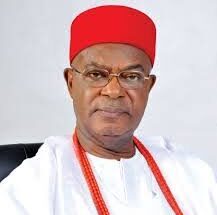”The labour of our heroes past shall never be in vain”, according to Nigeria national anthem. For far too long, the contributions and stories of great women during times of conflict have been often overlooked and buried beneath the weight of male-centric narratives. This analysis seeks to delve into the remarkable tales of the great women of Nigeria proving that heroism is not gender bound.
Dora Akunyili
The late Professor Dora Nkem Akunyili OFR fought against substandard and fake medications while at NAFDAC (National Agency for Food and Drug Administration and Control). She was the Director-General of NAFDAC from 2001 to 2008. Akunyili revealed threats she and her family faced during her work and provided information about people she targeted who threatened to destroy NAFDAC facilities. Akunyili died at a specialist cancer hospital in India on June 7, 2014 after a two-year battle with uterine cancer.
Funmilayo Ransome Kuti
The late Chief Funmilayo Ransome-Kuti was one of Nigeria’s premier female leaders and feminists. She was known as ‘the mother of Africa’ because of her human rights activism. Ransome-Kuti defended women’s rights and condemned the military government for human rights violations. The lady was elected to the Western House of Chiefs and acted as an Oloye of the Yoruba nation. Funmilayo had membership in the National Council of Nigeria and Cameroon and was the first Nigerian female to ride a motorcycle and drive a car. She was among the founders of the Nigeria Union of Teachers and the Nigerian Students Union. Kuti and her husband, Israel, had four children, Fela, Olikoye, Dolupo, and Beko. She was thrown out of the window of a commune belonging to her son in 1978 and died from her injuries.
Florence Nwapa
Florence Nwanzuruahu Nkiru Nwapa was called the mother of modern African Literature. The Nigerian author spearheaded a generation of African female writers. Florence Nwapa was the first African woman novelist to be published in the English language in Britain. She dedicated her time to helping refugees and orphans after the Nigerian civil war (1967 to 1970) that killed millions of Nigerians and Biafrans. By 1970, Nwapa had established the Tana Press. Her books spoke against the patriarchal society. She died of pneumonia in 1993 at 62.
As we reflect on the heroines of Nigerians. It is evident that these women demonstrated great courage in the face of conflict for the betterment and growth of society. Their stories are kept silent for too long, reminding us that history is vast and diverse. It’s time to ensure the world recognises the remarkable contributions by women, during times of conflicts. For when we acknowledge their heroism we inspire future generations to embrace equality and celebrate regardless of gender the true heroes among us.
Shedrach Stephanie,
Kaduna




